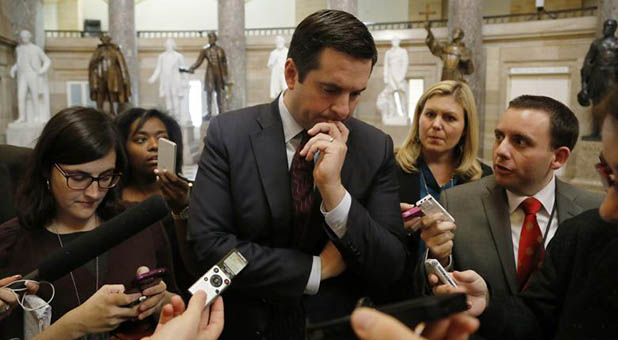Devin Nunes: I’m Not Recusing Myself
There’s an old adage in Washington, D.C., that goes something like this: “When they go after the whistle-blower, it’s because he’s got something really damaging.”
We don’t know who tipped off House Permanent Select Committee on Intelligence Chairman Devin Nunes (R-Calif.) to the evidence he was shown that proves national intelligence surveillance captured the conversations of many Trump transition team members, and possibly even the then-president-elect himself. We likely never will.
But Democrats and the anti-Trump establishment in Washington, D.C., are going full-tilt into attack mode over Nunes’ access to the classified intelligence intercepts and his decision to share their contents with the president. Tuesday afternoon, the congressman hit back at demands that he should recuse himself from the ongoing committee investigation into alleged Russian tampering of the 2016 presidential election with just three words:
“Why would I?”
Indeed, that’s a good question, and one the deep state and Washington establishment will have a difficult time answering, once you piece together all of the current evidence. Here’s what we know right now:
- March 20 — The HPSCI holds a rare open meeting with FBI Director James Comey and NSA Director Navy Adm. Mike Rogers to discuss surveillance related to Russian attempts to impact the election. At that hearing, Nunes makes a public call for anyone with additional information to come forward.
- March 21 — Nunes’ source within the Intelligence Community made contact and arranged for the congressman to review classified intelligence intercepts and reports in a Sensitive Compartmented Information Facility—frequently referred to as a “SCIF” or “skiff”—because of the sensitivity of the documents. Because the Intelligence Community and Congress operate on separate systems that are not interconnected, that meeting had to take place at the Eisenhower Executive Office Building, which is technically on the White House grounds, but has its own entrance.
- March 22 — After reviewing the information, much of which troubled him deeply, Nunes made the unilateral decision to announce he had seen the new evidence and then to alert the president as to what he had discovered. Even though these reports would have been created during President Barack Obama’s administration, President Trump still have access to them and the clearance to read them for himself. After the meeting, the president said he felt “somewhat vindicated” by what he learned. In interviews with the liberal mainstream media later in the day, Nunes shares that the NSA has been cooperating with the investigation, but the FBI has not provided answers to critical questions asked of it by the HPSCI.
- March 23 — HPSCI ranking member Rep. Adam Schiff (D-Calif.)—who previously accused the survivors of Beghazi of lying about what happened—called out Nunes for not keeping the new evidence secret until it had been reviewed by the entire committee and for taking the information to the president. Although the presence of the information in no way changes the ultimate facts in the matter, Schiff suggested that Nunes was allowing the White House to tamper with an independent investigation. Immediately, Democrats and Washington establishment Republicans begin the slow-drip attack on Nunes and calling on him to recuse himself from the investigation.
- March 24 — Several key members of the Trump campaign throughout various stages of the 2016 presidential campaign have volunteered to answer the HPSCI’s questions as part of its investigation.
- March 27 — The weekly HPSCI meeting is canceled. Several former Obama administration Intelligence Community officials were scheduled to appear and testify. The liberal mainstream media runs with a story that the White House asked for the meeting to be canceled because damaging information would be divulged. White House Press Secretary Sean Spicer declared those reports were patently false.
- March 28 — Nunes holds a press gaggle at which he declares he will ignore calls to recuse himself from the investigation, and that he will not divulge the source of the intelligence information that he reviewed one week prior. {eoa}














































